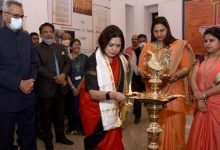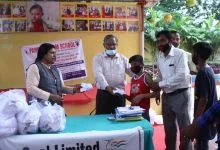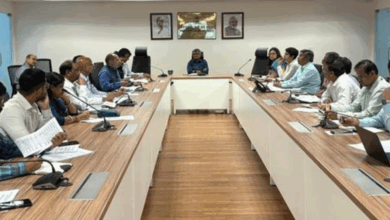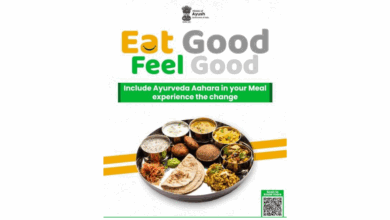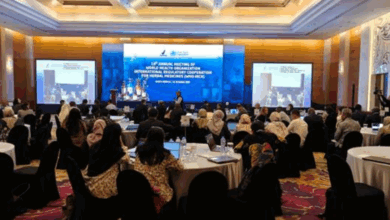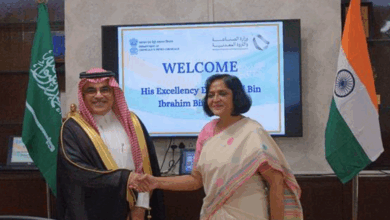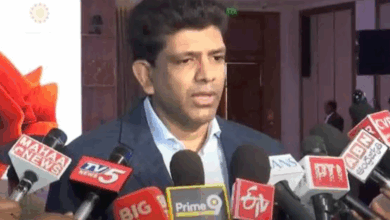The unique flagship initiative ‘Dhara: An Ode to Indian Knowledge Systems’ of the Ministry of Culture completes one year

10 conferences were successfully organised on diverse and distinct themes during the first year
The unique and flagship initiative “Dhara: Ode to Indian Knowledge Systems”, taken up under the aegis of Azadi Ka Amrit Mahotsav by the Ministry of Culture completed one year in February 2023. During its yearlong activities, it has been successful in creating public awareness, and stakeholder participation and helped to devise a framework for the promotion and revival of multiple domains of Indian Knowledge Systems. The programme was conceptualized as a series of lectures and discussions dedicated to specific areas of inquiry highlighting India’s civilizational achievements.
Dhara embodies that idea of a ‘continuous flow’ of knowledge and wisdom from one age to another, being adopted, questioned and modified over time so that we not only move ahead to the next level of insights across various fields but do so on the back of the work that is already available to us from our past. The Indian Knowledge Systems (IKS) Division of the Ministry of Education located at AICTE, New Delhi is the key execution partner for Dhara events.
Speaking about the genesis of the Dhara series, Shri Govind Mohan, Secretary, Ministry of Culture said, “Azadi Ka Amrit Mahotsav is an initiative of the Government of India to celebrate and commemorate 75 years of progressive India and the glorious history of its people, culture and achievements. After a prolonged struggle spread over more than 100 years on the back of several movements spearheaded by individuals and communities across the country, India successfully ousted the foreign rulers from the Indian subcontinent in 1947.
India’s journey from the beginning of time is dotted with consequential events, each of which added to the idea of India in a very unique and inevitable manner. For a long, these events have been stories limited to folklore or a part of a historian’s collective. It is time we walk down the annals of history and celebrate achievements that we didn’t know to belong to India; claim our contribution which innately belongs to Bharat and take forward the continuum of India’s contribution towards making the world a better place for humanity to thrive and coexist.”
The Dhara Series, of which 10 conferences have been successfully organised so far, have taken place on diverse and distinct themes titled: Indian contribution to Mathematics, Indian National Calendar, Dhara Astronomy and Astrophysics, IKS Mela on the National Education Policy (NEP)2020 and the role of Culture, Ayurdhara (I & II) on Ayurveda, National Martial Arts Mela on different national warrior traditions, Samudramanthan on India’s glorious Maritime Traditions, Sangita and Natya Parampara and Rasayanashastra on Indian Chemistry.
The conferences were aimed at bringing together various ministries, academia, industry practitioners, knowledge partners, and other stakeholders to create strategic collaborations which can further enable the consolidation of rigorous frameworks for scientific synthesis, propagation and protection of traditional knowledge systems while simultaneously ensuring its reach to the common citizen of the land.
The next conferences planned in the series are based on the metallurgical, agricultural and ancient economic thoughts and traditions of India.
Next phase of Dhara to hold conferences on metallurgical, agricultural themes and ancient economic thoughts and traditions of India

For each theme of Dhara, the far-reaching vision of this special initiative has been to create a Vision 2047 document that provides a strategic roadmap to the manner in which each of these specific domains can thrive and augment in the coming 25 years, with a determined resolve to facilitate the effective execution of the said desired goals by the government, along with the major stakeholders of that domain.
Each conference specifically focused on addressing the historicity and diversity of the knowledge system in question, facilitating the participation of multiple stakeholders across domains pertaining to that field of knowledge, and devising strategies for innovation and application grounded in contemporary scientific principles and indigenous epistemology through collaborative panel discussions between practitioners of the respective knowledge domains and the participation of the public. The conferences also featured a diverse set of cultural programmes in keeping with the theme and region they were conducted in.
Click here for details of the conferences
Each of the Dhara events had cultural events every evening by a wide range of top artists who demonstrated that art and culture have served and continue to do so, as very powerful instruments for the transmission, propagation and popularisation of Indian Knowledge Systems. The Dhara programmes also received very wide media coverage through print and audio-visual platforms on all occasions, creating awareness about our rich knowledge heritage among lakhs of people. This Jana-Bhandari in various forms was part of the main objective of Dhara which was to take the knowledge of the texts to the people – shastra se samaj tak.
The Dhara series has been a pivotal force in awakening national consciousness to its unbroken civilizational heritage and knowledge systems. It has created an emphasis on propagating and preserving the historicity and diversity of these traditions, creating innovative methodologies to bring them to the national consciousness, the importance of incentivizing local traditions and knowledge systems, facilitating collaborative efforts between practitioners, ministries, scholars and the public, empowering the youth to spearhead the national movement and importantly, encouraging rigour and excellence in academic research in various domains of Indian Knowledge Systems (IKS).
The Dhara series has also highlighted the need to capitalize on multimedia and multimodal representations of IKS and the importance of understanding both the diversity and depth of a particular knowledge domain in this system while diving deep into our traditions and history so that future generations can engage meaningfully with it.
Our history as an independent modern nation is 75 years young but our civilization is more than 5,000+ years old. Needless to say, the contribution of India to human knowledge is plenty, and what better time, than the occasion of Azadi Ka Amrit Mahotsav, commemorating seventy-five years of independence, to initiate a concentrated and focused effort in this direction.
Disclaimer: This is an official press release by PIB.

